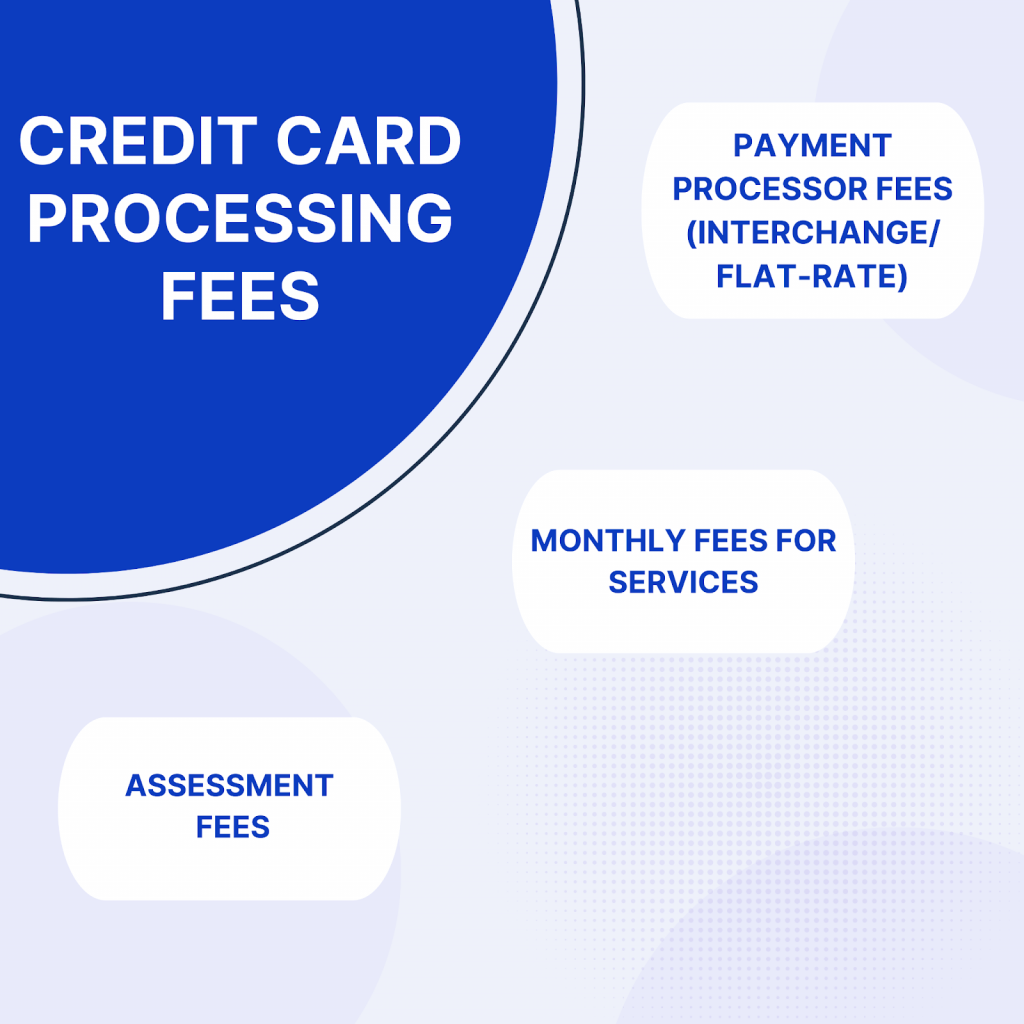Introduction
Whenever you swipe your credit card, there’s a behind-the-scenes dance of data and dollars that can leave you wondering, “How much is the credit card processing fee, and who’s taking a cut?” The answer to “who” is typically banks and payment processors, who charge fees to merchants for the convenience of accepting plastic. But the “how much” part can get complicated, involving a blend of fixed fees, percentage-based charges, and even interchange fees. Let’s dive into the world of credit card processing fees, exploring who pays them, how they’re calculated, and what merchants can do to navigate this financial landscape.
On average, businesses can expect to pay between 1.5% and 3.5% of each transaction in credit card processing fees. This fee covers the costs associated with processing the transaction, including authorization, settlement, and fraud prevention. The specific fee charged will vary depending on the type of credit card, the merchant’s industry, and the payment processor used.
Who Pays Credit Card Processing Fees?
In most cases, the merchant, or business owner, is responsible for paying credit card processing fees. These fees are typically deducted from the total amount of the transaction before the funds are deposited into the merchant’s account. However, some merchants may pass on some or all of these fees to their customers in the form of a surcharge. This practice is most common in the hospitality industry, where restaurants and hotels often add a surcharge to cover the cost of credit card processing.
Types of Credit Card Processing Fees
There are several different types of credit card processing fees that merchants may encounter. The most common types include:
- Interchange fees: These are fees charged by the credit card issuer to the merchant’s bank. Interchange fees vary depending on the type of credit card, the merchant’s industry, and the payment processor used.
- Assessment fees: These are fees charged by the payment processor to the merchant’s bank. Assessment fees are typically a flat fee per transaction.
How to Reduce Credit Card Processing Fees
There are several ways that merchants can reduce their credit card processing fees. Here are a few tips:
- Negotiate with your payment processor: The best way to reduce your credit card processing fees is to negotiate with your payment processor. Be prepared to discuss your business volume, industry, and average transaction size. You may be able to negotiate a lower rate if you are able to show your payment processor that you are a valuable customer.
- Use a payment processor that offers interchange-plus pricing: Interchange-plus pricing is a type of pricing model that allows merchants to see the interchange fees that they are being charged. This can help merchants to compare rates and find the best deal on credit card processing.
- Pass on some or all of the fees to your customers: As we mentioned earlier, some merchants choose to pass on some or all of their credit card processing fees to their customers in the form of a surcharge. This can be a good way to reduce the cost of accepting credit cards, but it is important to be aware that surcharges can deter customers from making purchases.
Conclusion
Credit card processing fees are a cost of doing business for merchants. By understanding the different types of fees and how they are calculated, merchants can take steps to reduce their costs and improve their bottom line.
Credit Card Processing Fees: A Comprehensive Guide
Navigating the complexities of credit card processing can be a daunting task if you’re new to online billings. The hidden world of fees and charges can leave you wondering, "How much is credit card processing?" Well, brace yourself for a comprehensive breakdown of credit card processing fees, leaving no stone unturned.
Unveiling the Types of Credit Card Processing Fees
Credit card processing fees, like a hydra’s multiple heads, come in many forms. Interchange fees, assessment fees, and PCI compliance fees are just a few of the beasts you’ll encounter in this realm. Buckle up as we delve into each fee, unraveling their mysteries.
Interchange Fees
Interchange fees, the bread and butter of credit card processing companies, are like the toll you pay for using a credit card. Every time a transaction takes place, a portion of the total amount goes to the card-issuing bank and the payment network (e.g., Visa, Mastercard). These fees vary depending on the type of card used (debit, credit, reward), the transaction amount, and the industry you operate in. They can range anywhere from around 1% to 3% of the purchase price.
Interchange fees are like the invisible tax we pay when we use our plastic money. They’re baked into the price of goods and services, subtly influencing our spending habits. Understanding these fees is crucial because they can significantly impact your business’s profitability.
**Real-World Analogy:** Imagine a medieval marketplace where merchants charge a small fee for using their scales to weigh goods. Interchange fees operate on a similar principle, a small levy for using the infrastructure that facilitates credit card transactions.
Assessment Fees
Assessment fees, the silent partner of interchange fees, are levied by the card networks (e.g., Visa, Mastercard) to cover their operational costs. These fees are typically a fixed amount per transaction, regardless of the transaction size. Visa, for instance, charges an assessment fee of around $0.10 per transaction, while Mastercard’s fee hovers around $0.05.
Assessment fees are like the administrative costs of running a credit card network. They ensure that the infrastructure supporting credit card transactions remains robust and secure. Without these fees, card networks would struggle to maintain their operations.
**Real-World Analogy:** Think of assessment fees as the membership dues you pay to a gym. They contribute to the upkeep of the facilities and ensure that you have access to the equipment you need.
PCI Compliance Fees
PCI compliance fees, the unsung heroes of credit card processing, are essential for protecting sensitive customer data. The Payment Card Industry Data Security Standard (PCI DSS) is a set of security requirements that businesses must adhere to when handling credit card information. PCI compliance fees cover the costs of maintaining and monitoring security measures, such as firewalls, encryption, and regular security scans.
PCI compliance fees are like the insurance premium you pay to safeguard your home against unforeseen events. They ensure that your business is taking proactive steps to protect customer data and minimize the risk of data breaches.
**Real-World Analogy:** Imagine a fortress with guards and surveillance cameras. PCI compliance fees are like the resources invested in fortifying your fortress, keeping intruders at bay.
Conclusion
The realm of credit card processing fees can be a labyrinthine maze, but with this comprehensive guide, you’re now equipped to navigate its intricacies. From interchange fees to assessment fees and PCI compliance fees, you have a clear understanding of the charges you may encounter. Remember, these fees are an unavoidable part of accepting credit card payments, and by optimizing your payment processing strategy, you can minimize their impact on your bottom line.
How Much Are Credit Card Processing Fees?
Credit card processing fees can vary significantly, typically ranging from 1.5% to 3.5% of the transaction amount. But, several factors can affect these fees, including the type of card used, the type of transaction, and the merchant’s processing volume. Understanding these factors can help businesses minimize their credit card processing costs.
Factors Affecting Credit Card Processing Fees
Type of Card
The type of card used can impact the processing fee. Credit cards, such as Visa and Mastercard, generally have lower fees than debit cards. This is because credit cards offer more fraud protection and rewards to consumers. American Express and Discover cards typically have higher fees than Visa and Mastercard due to their exclusive rewards programs and higher acceptance rates at certain merchants.
Type of Transaction
The type of transaction can also affect the processing fee. In-person transactions typically have lower fees than online or phone transactions. This is because in-person transactions involve less risk for the merchant. Card-present transactions, where the card is physically present and swiped or inserted, generally have lower fees than card-not-present transactions, where the card is not physically present and the transaction is processed over the phone or online. Additionally, recurring payments and international transactions often incur higher processing fees.
Merchant’s Processing Volume
The merchant’s processing volume can also impact the processing fee. Merchants who process a high volume of transactions may be eligible for lower fees from their payment processor. This is because payment processors can spread their fixed costs over a larger number of transactions, resulting in lower fees for high-volume merchants. Merchants can negotiate with their payment processor to secure lower fees based on their processing volume and other factors.
For example, a small business that processes $10,000 per month in credit card transactions may pay a processing fee of 3%. If the business increases its processing volume to $50,000 per month, it may be able to negotiate a lower fee of 2.5%. By understanding the factors that affect credit card processing fees, businesses can make informed decisions about their payment processing strategy and potentially save money on their transaction costs.
How Much is a Credit Card Processing Fee?
Credit card processing fees have become an unavoidable part of the modern business landscape. You may wonder, "How much is a credit card processing fee?" Let’s dive into the nitty-gritty of these fees and their implications for merchants.
Types of Credit Card Processing Fees
Credit card processing fees come in various flavors, each with its unique impact on merchants’ bottom lines. Let’s unpack the most common fee types:
- Interchange Fees: Assessed by card networks (e.g., Visa, Mastercard) and passed on to merchants, these fees cover the costs of processing transactions.
- Assessment Fees: Charged by the card network to reimburse issuing banks for their costs associated with issuing cards.
- Gateway Fees: Billed by the payment gateway, the intermediary that facilitates the communication between the merchant and the card network.
- PCI Compliance Fees: Merchants may incur these fees to maintain compliance with industry security standards.
- Chargeback Fees: Assessed when a customer disputes a transaction, resulting in the merchant reversing the sale and potentially paying an additional fee.
- Monthly Fees: Some payment processors charge a flat monthly fee for access to their services.
Impact of Credit Card Processing Fees on Merchants
Credit card processing fees can significantly impact merchants’ profitability and operational costs. These fees can influence pricing strategies and ultimately affect consumers’ purchasing decisions. Let’s explore the implications:
- Reduced Profit Margins: High processing fees can eat into merchants’ profits, especially for low-ticket items.
- Increased Operational Costs: Implementing and maintaining payment processing systems add to merchants’ operational expenses.
- Consumer Behavior: Processing fees can incentivize merchants to encourage cash or alternative payment methods, potentially shifting consumer spending patterns.
li>Pricing Adjustments: Some businesses pass on a portion of processing fees to customers by adjusting their prices, which can affect affordability.
Factors Affecting Credit Card Processing Fees
The amount you pay in credit card processing fees depends on several factors:
- Type of Card: Cards like American Express and Discover typically come with higher processing fees than Visa and Mastercard.
- Merchant Account Type: Retail, e-commerce, and high-risk merchants may have different fee structures.
- Processing Volume: Merchants with higher transaction volumes may negotiate lower rates.
- Payment Processor: Different processors have varying fee schedules.
- Industry: Certain industries, such as hospitality and healthcare, face higher processing fees due to higher risk profiles.
Negotiating Credit Card Processing Fees
Merchants have some room to negotiate credit card processing fees by:
- Comparing Processors: Seek quotes from multiple payment processors to find the best rates and terms.
- Increasing Processing Volume: Merchants with high processing volume may qualify for discounts.
- Negotiating with Banks: Merchants can negotiate interchange fees with their acquiring banks.
- Examining Fee Structure: Carefully review the fee structure of potential processors to identify hidden costs.
Conclusion
Credit card processing fees are a complex but critical aspect of modern commerce. By understanding the types of fees, their impact on merchants, and the factors that influence them, merchants can make informed decisions to minimize their processing costs and optimize their profitability. Remember, every cent counts in the competitive business landscape!



